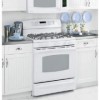GE P2B918DEMWW Installation Instructions - Page 42
TOOLS YOU WILL NEED, Operating Instructions, Safety Instructions, Troubleshooting Tips
 |
UPC - 084691166368
View all GE P2B918DEMWW manuals
Add to My Manuals
Save this manual to your list of manuals |
Page 42 highlights
Operating Instructions Safety Instructions Installation Instructions Installation of the range. TOOLS YOU WILL NEED s Phillips and flat-blade screwdrivers s Pencil and ruler s Two pipe wrenches (one for backup) s Open-end or adjustable wrench s Nut driver or wrench: 1/4 ″ s Drill s Flare union adapter for connection to gas supply line (3/4 ″ or 1/2 ″ NPT x 1/2 ″ I.D.) s Flare union adapter for connection to pressure regulator on range (1/2 ″ NPT x 1/2 ″ I.D.) s Liquid leak detector or soapy water. s Lag bolt or 1/2 ″ O.D. Sleeve anchor (for concrete floors only). ADDITIONAL MATERIALS YOU MAY NEED: s Gas line shut-off valve s Pipe joint sealant or UL-approved pipe thread tape with Teflon* that resists action of natural and LP gases. *Teflon: Registered trademark of DuPont s Squeeze Connector matching the size of the bracket opening (on the range back behind the wiring cover) and the house conduit. Obtain only if replacing the power cord with conduit. s Flexible metal appliance connector (1/2 ″ I.D.). A 5-foot length is recommended for ease of installation but other lengths are acceptable. Never use an old connector when installing a new range. LOCATION GUIDELINES Do not locate the range where it may be subject to strong drafts. Any openings in the floor or wall behind the range should be sealed. Make sure the openings around the base of the range that supply fresh air for combustion and ventilation are not obstructed by carpeting or woodwork. Your range, like many other household items, is heavy and can settle into soft floor coverings such as cushioned vinyl or carpeting. Use care when moving the range on this type of flooring. It is recommended that the following simple and inexpensive instructions be followed to protect your floor. The range should be installed on a sheet of plywood (or similar material). When the floor covering ends at the front of the range, the area that the range will rest on should be built up with plywood to the same level or higher than the floor covering. This will allow the range to be moved for cleaning or servicing. Also, make sure your floor covering will withstand 180°F. (See the Installation Safety Instructions section.) Make sure the wall coverings around your range can withstand the heat generated (up to 200°F) by the range. (See the Installation Safety Instructions section.) IMPORTANT! Remove all tape and packaging. Make sure the burners are properly seated and level. Take the accessory pack out of the oven. Check to be sure that no range parts have come loose during shipping. Consumer Support Troubleshooting Tips 42















